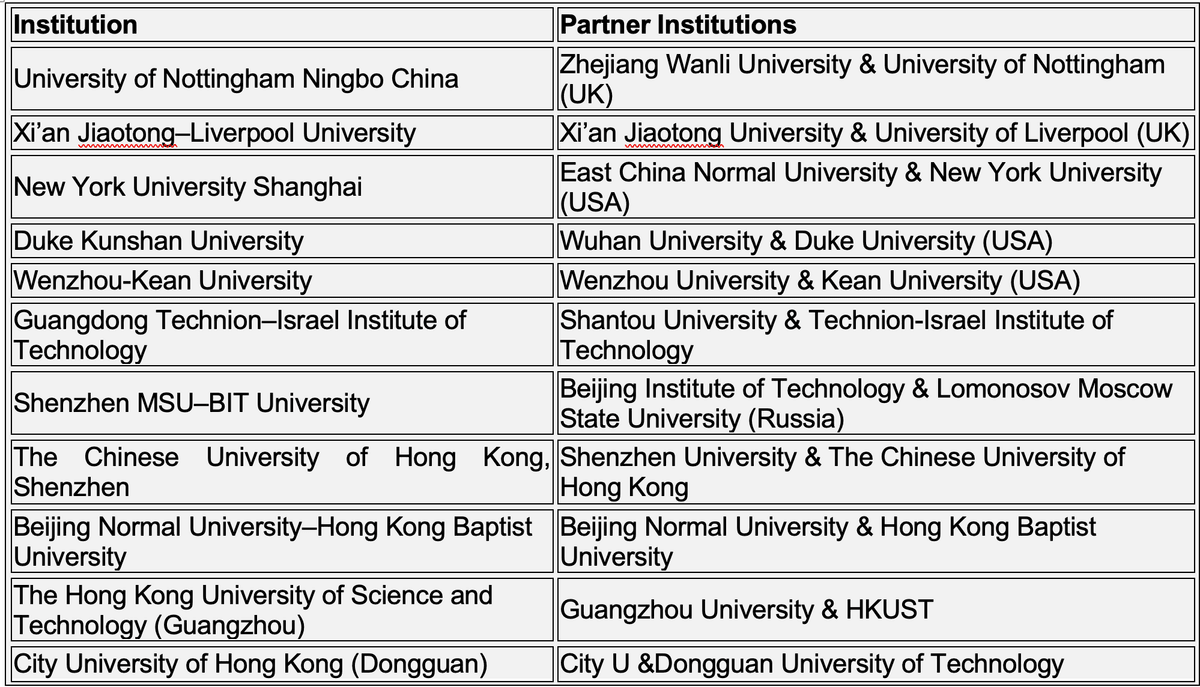China has long been a global hub for transnational education, hosting thousands of joint programmes and hundreds of cooperative institutes. Despite some also referring to their Joint Educational Institute (JEI) as a branch campus but, only a handful of institutions qualify as independently incorporated, legally registered Sino-foreign universities—commonly known as International Branch Campuses (IBC), 2 from the UK, USA (3), Russia (1), Israel (1), Germany (1), Switzerland (1) and 4 from HK all in located in Guangdong province.
Their establishment is heavily guided and supported by both central and local governments, reflecting a careful,
measured approach to internationalisation in Chinese higher education.
For international universities, IBCs represent a unique opportunity to deliver world-class education in one of the largest student markets in the world.
Higher Education-IBC
As of 2025, there are 11 independently incorporated Sino-foreign undergraduate universities in China, each
representing a strategic partnership between a leading Chinese university and an international counterpart.

These institutions deliver a combination of English-medium instruction, foreign faculty expertise, and globally recognised curricula, producing graduates who are competitive in international labour markets.
Overseas Higher Education in HainanFree Trade Port
Hainan Free Trade Port provides a special environment for foreign higher education institutions to operate
independently without a local partner:
- Hainan Bielefeld University of Applied Sciences – supported by Germany’s Bielefeld University of Applied Sciences
- Hainan Lausanne Tourism University – established independently by École hôtelière de Lausanne (Switzerland)
Leveraging Hainan’s regulatory incentives, these institutions develop specialized programs aimed at producing
globally competitive graduates while aiming to attract not only Chinese but international students.
Tuition Fees and Cost Considerations(2025)
Tuition varies widely across these institutions, some of the rough numbers:
- £10,000–12,000/year, such as the University of Nottingham Ningbo China, Xi’an Jiaotong–Liverpool University
- £15,000/year, the Chinese University of Hong Kong, Shenzhen
- £20,000–30,000/year, New York University Shanghai; Duke Kunshan University;
Student Scale and Reach
Student populations differ substantially: Xi’an Jiaotong–Liverpool University: Over 20,000 students, offering bachelor's and PhD programs across disciplines. However, the average initial scale of an IBC is about 6,000 students, with some exceptions depending on institutional strategies.
As a result of National Gaokao recruitment, most universities operate under a quota system, reserving a significant portion of seats for local students—a factor that affects admission strategy and geographic targeting.
However, IBCs in China does not limit themselves to teaching and learning alone, and also investing heavily in research and knowledge transfer to connect with the local economy.
Strategic Insights for International Universities
IBC's presence in China is limited, but the impact is immense and far-reaching. These universities operate in a hybrid model between public and private institutions, receiving initial government funding and ongoing annual support. This demonstrates the Chinese government’s deliberate and measured approach to approving and supporting IBCs.
Currently, all IBCs are located at the most affluent provinces and cities in China, largely Guangdong, Shanghai, Jiangsu and Zhejiang provinces. Geography is a critical factor in TNE, including IBC, as it influences affordability and accessibility for students.Institutions aiming to establish an IBC or expand in China must navigate quota systems, local regulations, and strategic government relations.
For foreign universities, China’s IBC landscape represents not just a market opportunity. This is not everyone’s cake. Neither is it easy to deliver, as it is often driven by the government’s support, whereas the local institutional partners play a less important role. But a successful IBC in China is a platform to shape the future of global higher education while partnering with the state and local institutions in a highly strategic, structured environment.
